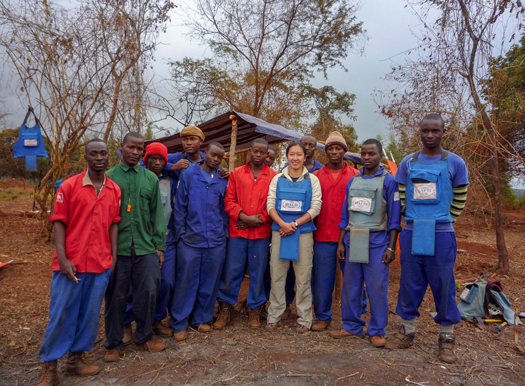This World Health Day meet HALO's staff training as paramedics in the minefield and find out about our fabulous medical board. Discover how clearing landmines helps families reach vital medical services and how safe land can improve the wellbeing of some of the world’s poorest people.
SAFE ACCESS TO HEALTH CARE
Health is a fundamental human right but half of the world’s population don't get the healthcare they need. Landmines and the explosive debris of war can cut off entire communities from clinics or stop new facilities being built.
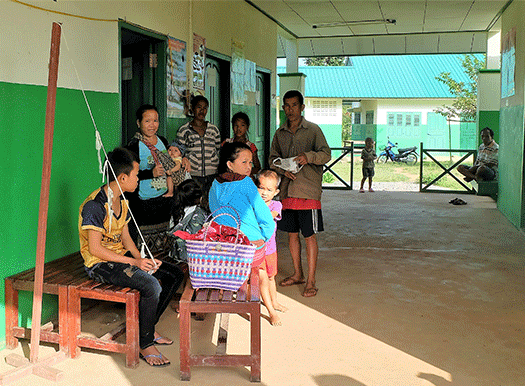
For the residents of Naphadang village in Laos, the nearest clinic was an hour away—along a road impassable in the rainy season. Plans were developed to build a health centre for the villagers but the area was strewn with explosives and needed to be made safe.
With funding from UK Aid, HALO prioritised clearing the clinic area and construction was able to begin. Today the centre treats over 120 people a month, from Naphadang and seven nearby villages. Besides offering basic health services, the clinic also gives childhood vaccinations, midwifery assistance and runs awareness programmes on personal hygiene, water and sanitation, birth control and risk education.
“I am very happy we have a clinic in Naphadang where we can serve the villagers both here and in the surrounding communities.” Dr. Nenseng, Head of the Clinic
Improved Health and Wellbeing
The presence of landmines stops precious farmland from being cultivated, livestock from being grazed, or blocks access to water. For vulnerable communities in some of the world’s poorest countries, this has a serious impact on health and wellbeing.
Clearing landmines lets rural people grow food and reach grazing land as well as opening access to markets. This improves food security, benefitting health and wellbeing. In Sayelau village in northern Afghanistan, the presence of landmines meant father of seven, Fakhrudin, was unable to fetch water from the nearby stream to irrigate his crops and his wife and children could not collect herbs or take their animals to graze. Fakhrudin was also badly injured by a landmine, meaning he couldn’t work for a year and he was forced to borrow money and food from his neighbours in order to survive. Clearing the landmines has transformed life for Fakhrudin and his family.
“The most important outcome for me is that my family is now safe. We can grow wheat and we have achieved an amazing harvest this year: 700kg of wheat!”
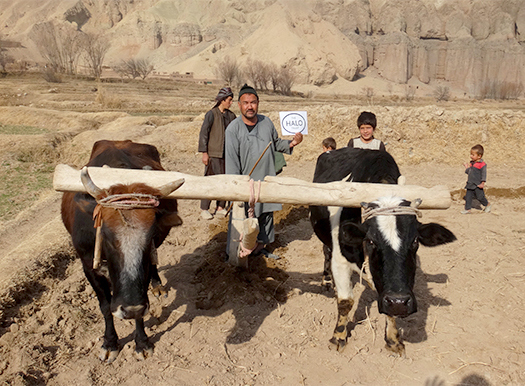
Victim Assistance
HALO works with local partners in countries like Zimbabwe, Afghanistan, Colombia and Laos to ensure that those injured by landmines and the explosive debris of war receive the support they need to regain their independence and live with dignity. Support can range from providing prosthetics for amputee victims, to livelihood assistance for survivors and their families. Often we are working to clear landmines and explosives in remote rural areas—places that are sometimes even inaccessible to other humanitarian organisations. So, by working with local partners to support the needs of mine survivors and their families, we are able to ensure they get the assistance they need.
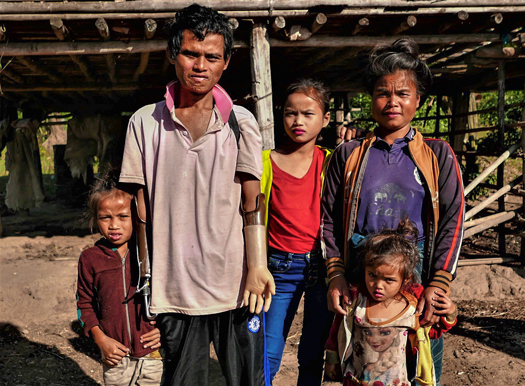
In 2015, Ing from Laos was badly injured when he hit a cluster bomb whilst cutting his grass. He lost both his arms and the sight in one eye. Before his accident, he was able to grow food for his wife Bing and four children on their one-hectare plot of land. But after his injury, the family struggled to survive. His son Sone and daughter Chillid had to drop out of school to help care for Ing and the family had to sell their land to make ends meet.
HALO first met Ing when a survey team visited his village. Realising the family needed urgent help, HALO took him to a rehabilitation facility. With the support of COPE (Cooperative Orthotic and Prosthetic Enterprise), he was fitted with two prosthetic arms. Ing was able to regain his independence and hopes to be able to begin farming again in the near future.
“It means so much to me that I am now able to be independent and carry out basic daily activities. It relieves the burden on my family and I do not feel helpless anymore.”
Paramedic Training
Although accidents involving HALO's work in the minefields are thankfully rare, our work deals with explosives which are fundamentally dangerous. We train members of all our demining teams as paramedics, teaching them how to deal with both minor and major injuries. As our teams often work in remote locations, our paramedics are also responsible for everyone’s day-to-day wellbeing. All members of our demining teams regularly practice evacuation drills—ensuring in the event of an accident, casualties can be treated and evacuated quickly and safely to hospital. Our paramedic deminers also regularly give medical assistance at road traffic accidents and, in the unfortunate event of a civilian mine accident, they provide emergency treatment and ambulance services.
Paramedic training gives our local staff new skills that are valuable in their own families and communities. Souern Chankea is a deminer with HALO Cambodia who has taken part in our paramedic training course.
"I signed up for the training because I want to have the experience and knowledge needed if there is an accident during work; I am learning how to treat my team mates and get them to hospital safely. More than that, now I can help my neighbours or my family if they have an accident. From what I have learned today, I would know how to treat a casualty of a traffic accident – something that I have seen happen before."
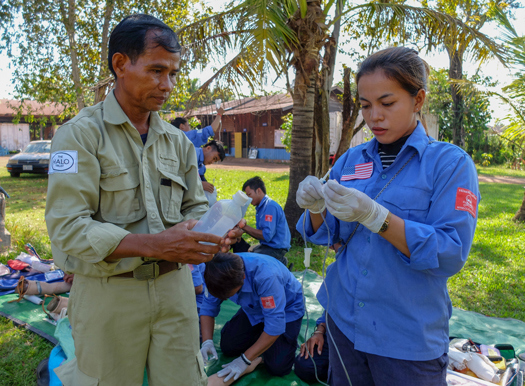
HALO's Medical Board
HALO’s medical board is a group of incredible professionals working in the NHS who volunteer their time to support HALO. They set the medical standards across all our programmes to ensure the health and wellbeing of our staff and develop the medical training courses for our minefield paramedics. The board constantly monitors and reviews HALO’s medical standards to ensure they are in-line with current medical best practice. They are on call ready to provide expertise in case of illness or accident, drawing on their wealth of experience. Every year, all our programmes are visited by a member of the medical board to provide additional training and to make sure all policies and standards are being properly followed. We are extremely grateful for their generosity and skill.
“I love working with HALO because the benefits of its work are seen immediately. The greatest satisfaction comes from working with local paramedics from communities living with landmines and seeing them develop their skills.” Doctor Gail Ng, Consultant in Emergency Medicine.
